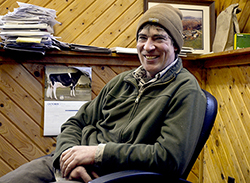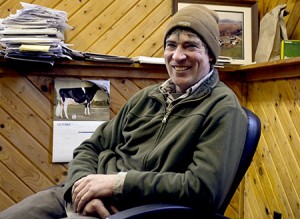

copyright the Chronicle January 14, 2015
by Joseph Gresser
WEST GLOVER — James Coe traveled by way of Oregon to get to the office at Andersonville Farm where he sat Thursday afternoon. As one of the owners and the managing partner of the farm, Mr. Coe now works a hundred yards or so from his boyhood home.
His office, a small wood-paneled room, is obviously not his main workplace. A wall calendar portraying a champion Holstein is still turned to October. Plaques recognizing the farm for producing quality milk are stacked on a windowsill, although it is hard to know where they would go. The hallway outside the farm’s office is lined with similar awards and there seems to be little room left for more.
In November, a partnership — including former sole owner Mark Rodgers, Mr. Coe, and Mateo and Andy Kehler of Jasper Hill Farm in Greensboro — bought the 200-acre dairy. Mr. Coe said he will run the farm, while Mr. Rodgers will remain in charge of breeding and genetics for the herd of 200 milkers.
Mr. Rodger’s concerns in breeding go beyond the normal ones of health and production, said Mr. Coe. He is also intent on building a herd made up entirely of polled Holsteins — cattle born without horns.
“It’s an animal welfare and humane issue,” Mr. Coe said, noting that farmers burn the horn buds of unpolled young calves so their horns don’t develop. This year, he said, about 90 percent of the calves born at Andersonville Farm will be naturally polled.
Part of the land Andersonville has been using for haying and pasture is leased from Elizabeth Nelson, Mr. Coe’s mother, who lives just down the road. When Jeff Kinsey, Ms. Nelson’s husband, died almost ten years ago she made what Mr. Coe termed “the smart decision,” to get out of farming and sell off her cows.
For the past three years, the Andersonville Farm has been shipping milk to Jasper Hill. The arrangement works well, Mr. Coe said. While Jasper Hill must use all the milk its herd of 45 Ayrshires produces, it can order only as much milk as it needs from Andersonville Farm, which is also a member of Agrimark, he said.
Jasper Hill is not interested in having an ownership stake in Andersonville Farm over the long haul, Mr. Coe said. It joined the partnership in order to ease the transition in ownership and maintain a supply of milk made to its specifications, he said.
Jasper Hill also has a chance to see if the production techniques it uses with its small herd can be scaled up for an operation the size of Andersonville Farm.
Andersonville, like Jasper Hill, pastures its cows or feeds them on dry hay with some additional grain, Mr. Coe said. Neither farm feeds silage or other fermented feed. There is nothing inherently wrong with silage, he was quick to say, but it doesn’t work if one wants to produce milk suitable for making fine cheeses.
Cows are an olfactory animal, and the smells they breathe a half hour before milking can affect the flavor of their milk, just as much as what they eat will, Mr. Coe said.
“You can make milk taste like gasoline if you put a bucket of gas in front of a cow just before milking,” Mr. Coe said.
Recent research shows that the microbiological community that lives around animals in a barn has a strong effect on the quality of milk, Mr. Coe said.
“Ninety percent of the microbes that contribute to flavor come from the outside of a cow’s teat, not the inside,” he said. This means the cow’s condition and the cleanliness of their environment are vital to producing milk for the types of cheeses Jasper Hill wants to make.
Mr. Coe said he has been working to solve at least one other problem in making a large volume of milk that meets Jasper Hill’s requirements.
The equipment Andersonville uses to feed its cows is designed to use a blend that includes silage. The sticky quality of silage ordinarily keeps the grain stuck into the feed mixture, he explained.
When silage is removed from the mixture and replaced with dry hay, the grain often sifts out of the mixture and onto the barn floor, Mr. Coe said. There it becomes the object of contention, with the more aggressive cows shoving the less assertive ones out of the way and eating more than their share. That is not just unfair, it can be a serious health problem for the cows who consume too much corn.
A first attempt at correcting the problem, he said, was to make the grain itself sticky by mixing it with molasses. That turned out to be a dead end, because the amount of molasses necessary to glue grain to hay would throw the nutritional profile of the feed out of whack.
Mr. Coe said he might end up putting in a system that keeps track of cows by means of computer chips and dishes out the exact amount of grain for that individual at milking time. Such a solution would effectively mimic the individual treatment members of the Jasper Hill herd get, but at present is too costly.
Developing a feeding system that meets the needs of both cows and Jasper Hill is the kind of problem Mr. Coe is ideally suited to handle. After graduating from Lake Region Union High School he trained as an architect at the Rhode Island School of Design (RISD).
He practiced his trade in Oregon until the financial crisis shut down the construction business in 2009. He then came home to Glover with his wife, Nella, who is also an architect, and their two children, Isabella and Jude. Together they have been running a maple sugar operation on the family farm.
When he got back to Vermont, Mr. Coe noticed the Kehler brothers were engaged in a number of very interesting projects.
He soon was involved serving as an in-house architect and construction manager. Among other projects, Mr. Coe helped design and supervise construction of the “green machine,” a system that uses the waste from the Jasper Hill herd and cheese making business to produce hot water for the dairy and creamery.
Now Mr. Coe is what both he and Mateo Kehler term “the champion” of Andersonville Farm. That means he will be looking out for the entire production system.
Mr. Coe said the land and hay production are in good shape right now, as is the herd. Over time, he said, it might be necessary to start the initial portion of the cheese making process at Andersonville Farm, and move green cheeses to the Greensboro caves for aging.
It is the kind of problem Mr. Coe enjoys and is well equipped to solve.
contact Joseph Gresser at [email protected]
For more free articles from the Chronicle like this one, see our Featuring pages. For all the Chronicle’s stories, subscribe:
Print subscription
Annual online subscription
Short-term online subscription







